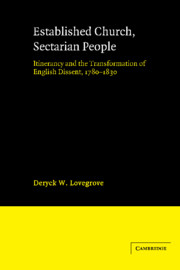 Established Church, Sectarian People
Established Church, Sectarian People Book contents
- Frontmatter
- Contents
- List of figures
- Preface
- Acknowledgements
- List of abbreviations
- 1 The Established Church and English Separatism
- 2 Itinerancy and Dissent
- 3 Preachers and sponsors
- 4 The academic leaven
- 5 Organization and infrastructure
- 6 Support and opposition
- 7 Criticism and legality
- 8 Developments and trends
- Conclusion
- Appendix A Journal of T[homas] Wastfield, June 1797–April 1798
- Appendix B Organizations active in itinerant evangelism
- Appendix C Baptismal statistics
- Notes
- Bibliography
- Index
7 - Criticism and legality
Published online by Cambridge University Press: 13 October 2009
- Frontmatter
- Contents
- List of figures
- Preface
- Acknowledgements
- List of abbreviations
- 1 The Established Church and English Separatism
- 2 Itinerancy and Dissent
- 3 Preachers and sponsors
- 4 The academic leaven
- 5 Organization and infrastructure
- 6 Support and opposition
- 7 Criticism and legality
- 8 Developments and trends
- Conclusion
- Appendix A Journal of T[homas] Wastfield, June 1797–April 1798
- Appendix B Organizations active in itinerant evangelism
- Appendix C Baptismal statistics
- Notes
- Bibliography
- Index
Summary
The coming of the French Revolution produced in England a widespread agitation for political reform; an expression of democratic idealism which struck fear into the heart of the English Establishment. In spite of the moderation and lack of concert shown by those who espoused the radical cause, the alarm felt by Parliament was sufficient for the government of William Pitt to secure the suspension of habeas corpus, and the enactment of repressive legislation prohibiting seditious meetings and assemblies and imposing the severest of penalties upon those found guilty of inciting contempt for monarchy or constitution. Already the quasi-republican sentiments of Richard Price had earned the unequivocal condemnation of Edmund Burke, and that rebuff had been reinforced in the legislature by the abject failure of Price's co-religionists to secure the repeal of the Test and Corporation Acts. In the years following 1795 the legal position of Protestant Dissenters appeared increasingly precarious as political tension threatened to spill over into the religious field with measures designed to curb the insidious effects of popular preaching.
Although the 1790s saw no new restrictions placed upon religious freedom, itinerant preachers were not unaware of their legal vulnerability at moments of particular political sensitivity. The newly appointed agent of the Essex Baptist Association arrived at Rayleigh in June 1797 to find himself at the centre of a highly charged situation:
Instead of being received with a hearty welcome, he was informed, that, altho' it was desirable to have preaching, it was not the proper time to begin:- because of the mutiny in the fleet at the Nore, opposite Southend, near Rayleigh;- the troops were at Southend to keep off the rebels, and that the whole country was ripe for rebellion. […]
- Type
- Chapter
- Information
- Established Church, Sectarian PeopleItinerancy and the Transformation of English Dissent, 1780–1830, pp. 121 - 141Publisher: Cambridge University PressPrint publication year: 1988
